Hi there!
You’re here because you want EXCITING, positive Japanese phrases and quotes. The kind that remind you that life is worth living for! And you want to learn a little Japanese too, right? Great! Take this lesson…
- Read, review, and read out loud – YELL these words!
- Print it out as physical review material (I like printing stuff)
- Save images for your personal use (as flashcards)
Japanese Lesson: Learn 25 Positive Japanese Phrases & Quotes
 | Want FREE Japanese Vocab & Phrase PDF Lessonss? Click Here to Get 20+ FREE PDF Lessons from JapanesePod101 (a Japanese learning program.) |
1. You’re not alone. あなた一人じゃない。
- Romanization:
- Anata hitori janai.
This is an easy one. Anata means you, hitori is one person or alone, and janai is “are not.” This is one of the easiest positive Japanese phrases you’ll learn here.

2. You can do it. あなたならできる。
- Romanization:
- Anata nara dekiru.
Dekiru is a verb and it means to be able. What about nara? It means if but as a rule, it places emphasis on the word before it. It literally means, “if it’s you, you can do it.” But if you were to interpret instead of translating directly, the nara emphasizes that YOU can do it.

3. Stay positive 前向きにね。
- Romanization:
- Mae muki ni ne.
Maemuki means positive or proactive. Ni is a particle that implies direction of movement. So, it’s suggesting that you stay positive and keep on being positive.

4. It’s okay. いいんだよ。
- Romanization:
- iin dayo.
If you’re a Japanese beginner, you should already know that ii means good.
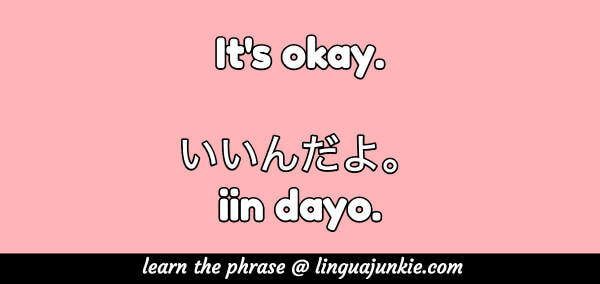
5. Get focused! 集中しろ!
- Romanization:
- Shuuchuu shiro!
This word, shuuchuu, should be a new one for most beginners. Literally, it means concentration. Probably one of my more favorite positive Japanese phrases. Very motivational!

6. Hang in there! 頑張れ
- Romanization:
- Ganbare
To ganbaru (頑張る) is to do your best. So the “re” here makes it into an informal command. Also, this word can be interpreted in many ways like “do your best” and “keep at it.”

7. It’s never too late to start something. 何事も始めるのに遅すぎるということはない。
- Romanization:
- Nanigotomo hajimeru no ni ososugiru to iu koto wa nai.
Ah, there’s a new word here. Nanigotomo! It means anything or whatever. The next word, hajimaru, means to begin. Then, you have the adjective and verb combination, (ososugiru), meaning too slow. The original form of the adjective is osoi but we drop the i and add the verb, sugiru, which means “to do too much, overdo” or generally, too much of something.
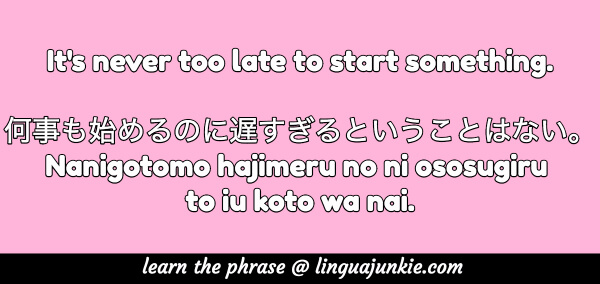
8. Everything is an experience. 何事も経験だからね。
- Romanization:
- Nanigotomo keiken dakara ne.
The only new word here is keiken which means experience.

9. I don’t think all people are bad. 私は全ての人が悪い人だとは思いません。
- Romanization:
- Watashi wa subete no hito ga warui hito da to wa omoimasen.
Subete means all, hito is people and warui means bad. Simple enough, eh?

10. You can do it if you try! やればできる!
- Romanization:
- Yareba dekiru!
You already know dekiru from an earlier entry. Yareba is the conditional form of yaru, which means to do. Conditional means that you’d like to express an “if” statement. So, it becomes “if you do” or “if you try.”

11. I’m not done yet. まだ終わっていないです.
- Romanization:
- Mada owatteinai desu.
Mada is yet and owatteinai is the negative present continuous form of owaru (to end). So, remember, you’re not done yet.
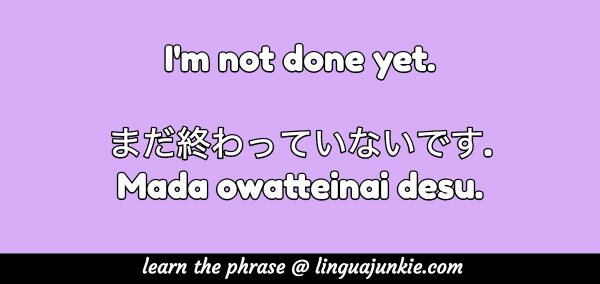
12. You might die tomorrow, so enjoy your life today. 明日死ぬかもしれないなら、今日を楽しく生きなさい。
- Romanization:
- Ashita shinu kamoshirenai kara, kyou wo tanoshuku ikinasai.
Well this is not one of the most super positive Japanese phrases. But, it does get to the point.
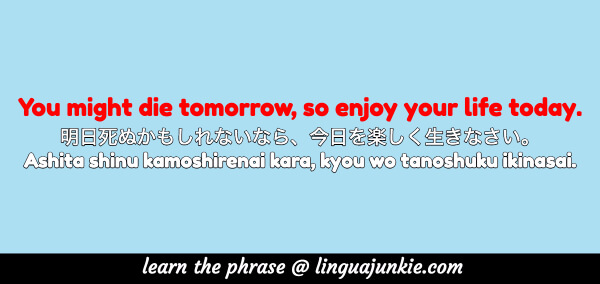
13. Don’t lose sight of your goals, especially when you’re going through a tough time. 辛い時こそ目標を見失わないで
- Romanization:
- Tsurai toki koso mejirushi wo miushinawanaide.
Tsurai is difficult, rough or painful. The next word, toki, means time. Then, mejirushi means landmark but it can mean goal as well. Finally, the last one is the verb miushinau meaning to miss.

14. The most important thing is to enjoy your life – to be happy – it’s all that matters.
- 何より大事なのは、人生を楽しむこと。幸せを感じること、それだけです。
- Romanization:
- Nani yori daijina no wa, jinsei wo tanoshimu koto. Shiawase wo kanjiru koto, sore dake desu.
Naniyori means most or above all. Daiji means important. Then, jinsei means life and tanoshimu is the verb meaning to enjoy. Shiawase means happiness or happy and is a good word to know in general. Then, kanjiru means to feel.
- Yori is a good grammar point to know. It’s often used for comparisons and te word before it is the lesser of the two.
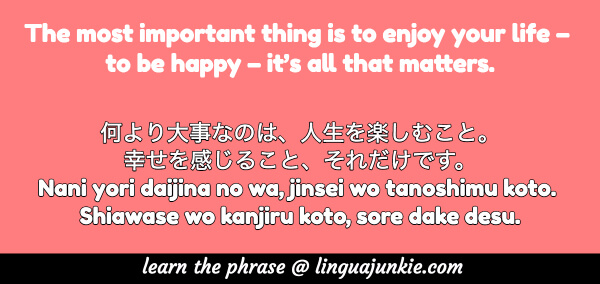
15. Keep hope alive! 希望を生かし続けなさい。
- Romanization:
- Kibou wo ikashitsuzukenasai.
Kibou is another good word to know; it means hope. You will see it a lot. Next, ikashitsuzukenasai is a combination of 2 verbs. Ikasu means to keep alive. Tsuzukeru maans to continue.
- The nasai ending makes this a polite, but firm command. You will hear teaches use this on their students and parents on their children. Must-know grammar point.
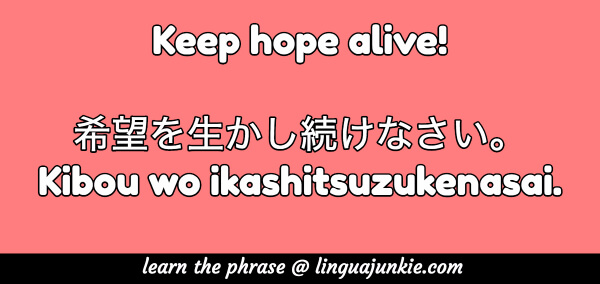
16. If you want the rainbow, you gotta put up with the rain.
- 虹を見たければ、ちょっとやそっとの雨は我慢しなくちゃ。
- Romanization:
- Niji wo mitakereba, chotto yasotto no ame wa gaman shinakucha.
Niji is rainbow, chottoyasotto means merely, ame is rain and gaman (patience) suru means to be patient or to endure.
- The use of the nakucha ending makes this a “you must” statement. It’s also a casual one.
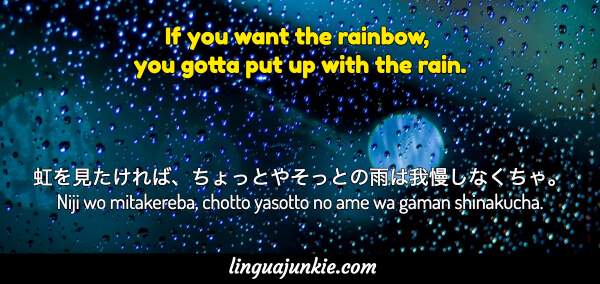
17. If you don’t know where you are going, any road will get you there.
- もしもあなたがどこに行くか迷っていても、道が導いてくれる。
- Romanization:
- Moshimo anata ga doko ni iku ka mayotteitemo, michi ga michibiite kureru.
What’s this mean exactly? It means that if you don’t know where to start, for example when learning Japanese, or where to go, just choose one thing and stick with it. That is enough. The rest, you will figure out along the way.
Most people make the mistake of trying to “start right” and never really start nor continue at all.
- Moshimo – if
- mayou Matteite) – to lose one’s way
- Michi – street, way, path
The verb, mayotteitemo, is in the present continuous form and combined with the “itemo” ending which means “even if.” So, even if you lose your way.
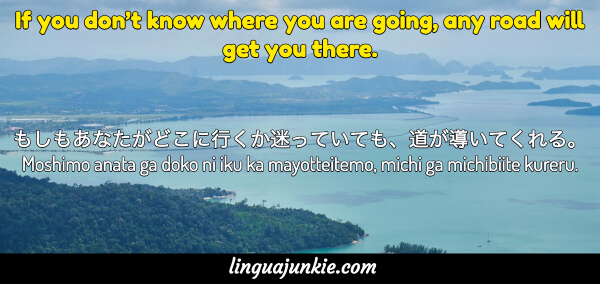
18. There is really no such thing as bad weather, only different kinds of good weather.
- 本当に悪い天気なんてものはない。ただ、さまざまな種類のよい天気があるだけだ。
- Romanization:
- Hontou ni warui tenki nante mono wa nai. Tada, samazamana shuurui no yoi tenki ga aru dake da.
Do you agree with this one? The point here is that weather is weather regardless of what your opinion of it is. So, it may as well be good and does have to affect you. This is another one of my favorite positive Japanese phrases.
- Hontouni – really
- Tenki – weather
- Warui – Bad
- Tada – Just/simply
- Samazama – various
- Shuurui – type
- Yoi – Good
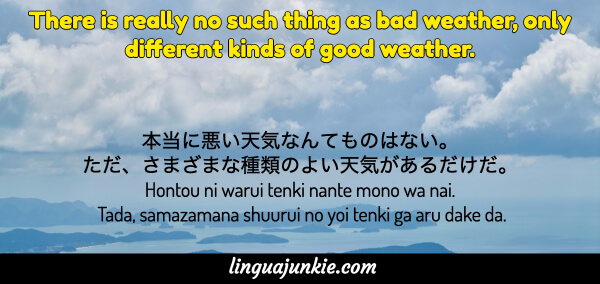
19. Be of good cheer. Do not think of today’s failures, but of the success that may come tomorrow.
- 元気を出しなさい。今日の失敗ではなく、明日訪れるかもしれない成功について考えるのです。
- Romanization:
- Genki ni shinasai. Kyou no shippai de wa naku, ashita atozureru kamoshirenai seikou ni tsuite kangaeru no desu.
Always a good reminder. It’s always good to be genki because people see you based on what you show them. Plus, they react in a similar way. So if they see you’re positive, that helps them feel better and be positive too.
- Genki – Healthy/Upbeat
- Shippai – Failure
- Ashita – Tomorrow
- Atozureru – To come, to arrive, to appear
- Seikou – Success
- Ni Tsuite – About
- Kangaeru – To Think
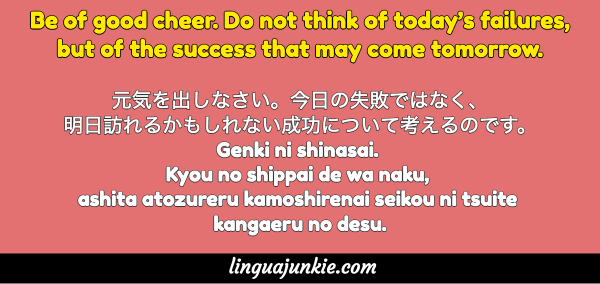
20. I walk slowly, but I never walk backward. 私の歩みは遅いが歩んだ道を引き返すことはない。
- Romanization:
- Watashi no ayumi wa osoi ga ayunda michi wo hikikaesu koto wa nai.
Don’t try to compare yourself to faster people. Go at your pace and try to beat yourself first. And as long as you’re walking in the right direction consistently, you’ll be okay. Let’s break this one down.
- Ayumi – walking
- Ayumu(ayunda) – to walk/to go on food
- Michi – road, path, street
- Hikikaesu – to go back, repeat, turn back
This is yet another one of my favorite positive Japanese phrases.
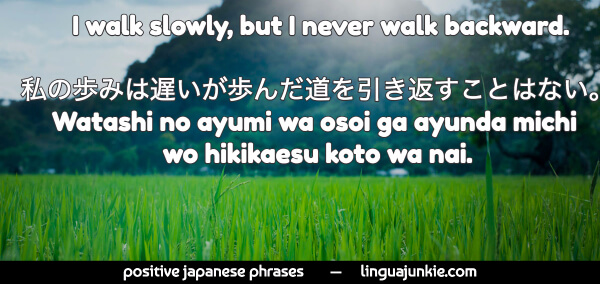
21. Growth is often a painful process. 成長は往々にして苦痛を伴う過程である。
- Romanization:
- Seichou wa ouou ni shite kutsuu wo tomonau katei de aru.
Ever notice how learning something, like Japanese, or sticking with something begins to feel like work? That you get tired? Well, here’s your answer. Growth is often a painful process. Should it be fun and enjoyable? Ideally you’d WANT that, but if it is, it’s not changing you. And that’s how people and companies deceive you — have fun and change yourself at the same time! No, it doesn’t work that way.
- Seichou – growth
- Ouounishite – occasionally
- Kutsuu – pain/agony
- Tomonau – to accompany
- Katei – process
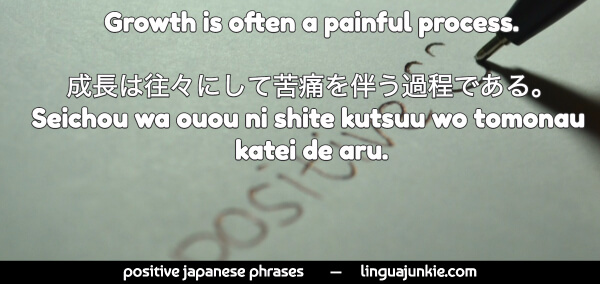
22. Failure is a detour, not a dead-end street. 失敗は回り道。行き止まりの道ではない。
- Romanization:
- Shippai wa mawarimichi. Ikidomari no michi de wa nai.
Okay, let’s break this next entry down.
- Shippai – failure
- Mawarimichi – detour
- Ikidomari – deadend

23. The future starts today, not tomorrow. 未来は今日始まる。明日始まるのではない。
- Romanization:
- Mirai wa kyou hajimaru. Ashita hajimaru no de wa nai.
Similarly, your Japanese learning starts today, continues today, and can not wait until tomorrow. Like Apollo Creed said, “there is no tomorrow!”
Oh, I’m getting off topic. Here are the key words for this phrase:
- Mirai – future
- Kyou – today
- Hajimaru – to begin
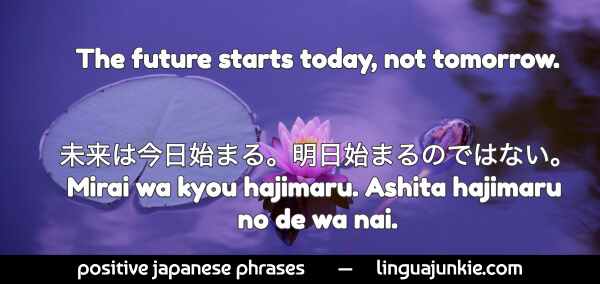
24. Happiness depends upon ourselves. 幸せかどうかは、自分次第である。
- Romanization:
- Shiawase ka dou ka wa, jibun shidai de aru.
Shidai is a good word to know here. It means “depends.” You add it after whomever or whatever it depends on. So, in this case, it’s jibun (oneself).
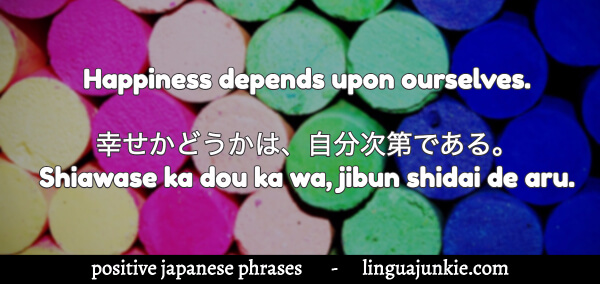
25. Never, never, never, never give up. 決して、決して、決して、決して、諦めるな。
- Romanization:
- Kesshite, kesshite, kesshite, kesshite akirameruna.
If you didn’t quite get it, I’ll tell you again – kesshite means never. If you’re still having problems remembering, leave me a comment and I’ll mail a printout of this article to you!
The new word here is:
- 諦める/Akirameru – to give up
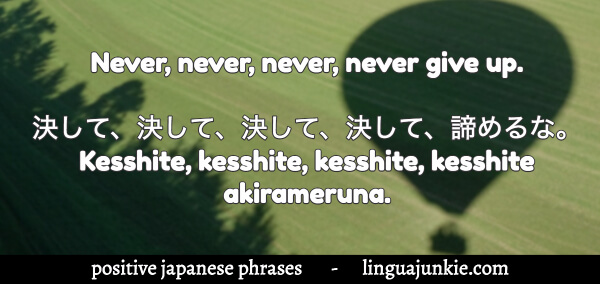
Conclusion
Whew, that was a big lesson.
Now you know 25 positive Japanese phrases and a whole lot of words and grammar. Which one was your favorite? Want to see more?
Leave me a comment below because now I’m tired from all the writing and want to hear from you.
Other articles to check out.
- Japanese MP3 Lessons
- Japanese Textbooks
- Get the Japanese self study guide here: Click here
– The Main Junkie
P.S. I highly recommend this for Japanese learners. If you REALLY want to learn Japanese with effective lessons by real teachers – Sign up for free at JapanesePod101 (click here) and start learning!
